Strictly Personal
Visiting Germany, UK, confronted but didn’t slay colonial monsters in EA, By Charles Onyango-Obbo
Published
6 months agoon

Big men from two former colonial powers in East Africa were in the region at the same time last week, softly singing mea culpas.
President Frank-Walter Steinmeier was in Tanzania and expressed his “shame” at crimes committed during Germany’s colonial rule in then-Tanganyika.
“I would like to ask for forgiveness for what Germans did to your ancestors here,” Steinmeier said during a visit to the Maji Maji Museum in Songea, the capital of Ruvuma Region in southwestern Tanzania.
Tanzania was part of German East Africa until 1920, when in the wake of Germany’s defeat in World War I, it became a British mandate.
Between July 1905 and August 1907, Germany faced a determined rebellion against its predatory labour and agricultural policies in southwestern Tanganyika, the famed Maji Maji Rebellion.
As it had in its other colonies, especially in German South West Africa, now Namibia, German suppression of the uprising was unflinchingly brutal, killing between 200,000 and 300,000 local people.
Steinmeier said Germany was ready to work with Tanzania towards a “communal processing” of the past.
“What happened here is our shared history — the history of your ancestors and the history of our ancestors in Germany,” he said, promising to “take these stories with me to Germany so that more people in my country will know about them”.
Steinmeier’s trip to Tanzania, coincided with a visit by the UK’s King Charles III, accompanied by his wife Queen Camilla, to Kenya.
The Mau Mau uprising in Kenya, which lasted from 1952 to 1960 was to Britain, what the Maji Maji rebellion was to Germany.
A land and political rights movement led by the Kenya Land and Freedom Army (KLFA), based mainly in central Kenya. According to Kenyan historians, as the movement broadened, it got a popular Swahili street name, “Mzungu Aende Ulaya, Mwafrika Apate Uhuru” (Let the foreigner go back abroad, let the African regain independence), which was abbreviated to Mau Mau.
Radical Kenyan history holds that the British preferred to use the term Mau Mau instead of KLFA “to deny the Mau Mau rebellion international legitimacy”. Meanwhile, the revolutionaries themselves adopted it “to counter colonial propaganda”.
A conservative counting puts the number of deaths among the Mau Mau and other forces at 11,000. More recent reckonings put the figure at between 20,000 and 30,000. This included 1,090 executions by hanging. Most of these casualties were African. By the end of the war, the Mau Mau had killed 32 European civilians. The British also established over 100 concentration camps, where Kenyans were held in degrading conditions.
Ahead of the visit, activists and relatives of those maimed or killed during the colonial era demanded that King Charles apologise for the atrocities.
He did – sort of. Biting down on the proverbial British upper lip, King Charles walked gingerly around the subject.
“The wrongdoings of the past are a cause of the greatest sorrow and the deepest regret. There were abhorrent and unjustifiable acts of violence committed against Kenyans as they waged…a painful struggle for independence and sovereignty – and for that, there can be no excuse”, he said at a state banquet in his honour at Nairobi State House.
“In coming back to Kenya, it matters greatly to me that I should deepen my own understanding of these wrongs, and that I meet some of those whose lives and communities were so grievously affected,” the king said.
Steinmeier was sorry and promised to raise awareness of German colonial atrocities at home, and King Charles said he was learning from Britain’s “unjustifiable acts of violence”. What are Tanzanians and Kenyans, and indeed formerly colonised Africans, doing?
There were nationalist movements that led to independence, and an often virulent anti-colonial/imperialist political and intellectual tradition has taken root in many African countries. But, decades later, there is still no serious study or teaching of why colonialists succeeded; what that says about African societies of the time; and what we might learn from that period to fortify ourselves against malevolent foreign forces in future.
To his credit, Uganda President Yoweri Museveni is almost alone among African leaders in consistently raising difficult questions about the slave trade, colonialism, and Africans’ culpability.
He often argues in speeches and has written severally, that Africans were subjugated by European colonialists because they were divided. That they were technologically backward. The African chiefs and kings were corrupt, stupid, and not ideologically progressive, so they sold their people and land for trinkets, a few guns, and whisky.
However, because his nearly 40-year-long rule has not been a stellar example of an enlightened democratic Africa, marred as it has been by nepotism, corruption, violence, election rigging, and opportunistic alliances with superpowers, the similarities to the colonial era have too often been uncomfortable. As a result, he is often forced to speak from both sides of his mouth.
But for setting the direction where we need to look hard, he can’t be faulted. So the chiefs and kings were stupid and greedy. Why? African societies were technologically backward and didn’t develop machine guns first. Why? Africans participated in capturing fellow Africans and selling them to Arab, and later European, slavers. Why? Why did some rise in the Maji Maji and Mau Mau rebellions, while others rolled over or collaborated?
Perhaps the most meaningful reparations Steinmeier and King Charles can pay is to put money into examining why we dropped the ball. Of course, we will have to fight to ensure that our modern chiefs, like their predecessors, don’t steal it.
Charles Onyango-Obbo is a journalist, writer, and curator of the “Wall of Great Africans”. X@cobbo3
You may like
-


Intel Liftoff Hackathon 2024 calls for applications from African AI startups
-
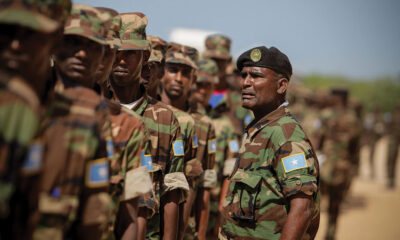

African leaders seek change in fight against terrorism at Nigerian summit
-


Africa’s largest tech hub AfriLabs welcomes 16 new additions
-
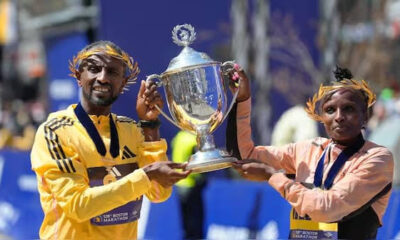

Ethiopia’s Lemma, Kenya’s Obiri give Africa double podium finish at Boston Marathon
-


Briton Russell Cook makes history as first man to run the length of Africa
-
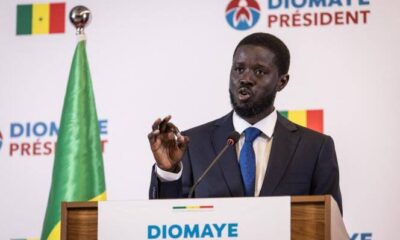

Behind the News: All the backstories to our major news this week
Strictly Personal
This Sudan war is too senseless; time we ended it, By Tee Ngugi
Published
21 hours agoon
April 28, 2024
Why are the Sudanese Armed Forces (SAF) and the paramilitary Rapid Support Forces (RPF) engaged in a vicious struggle? It is not that they have ideological, religious or cultural differences.
Not that people should fight because of these kinds of differences, but we live in a world where social constructions often lead to war and genocide. It is not that either side is fighting to protect democracy. Both sides were instruments of the rapacious dictatorship of Omar el-Bashir, who was overthrown in 2019.
Both are linked to the massacres in Darfur during Bashir’s rule that led to his indictment by the International Criminal Court for crimes against humanity. They both stood by as ordinary, unarmed people took to the streets and forced the removal of the Bashir regime.
None of these entities now fighting to the last Sudanese citizen has any moral authority or constitutional legitimacy to claim power. They both should have been disbanded or fundamentally reformed after the ouster of Bashir.
The SAF and the RSF are fighting to take over power and resources and continue the repression and plunder of the regime they had supported for so long. And, as you can see from news broadcasts, they are both well-versed in violence and plunder.
Since the fighting began in 2023, both sides have been accused of massacres that have left more than 30,000 people dead. Their fighting has displaced close to 10 million people. Their scramble for power has created Sudan’s worst hunger crisis in decades. Millions of refugees have fled into Chad, Ethiopia and South Sudan.
The three countries are dubious places of refuge. Chad is a poor country because of misrule. It also experiences jihadist violence. Ethiopia is still simmering with tensions after a deadly inter-ethnic war.
And South Sudan has never recovered from a deadly ethnic competition for power and resources. African refugees fleeing to countries from which refugees recently fled or continue to flee sums up Africa’s unending crisis of governance.
Africa will continue to suffer these kinds of power struggles, state failure and breakdown of constitutional order until we take strengthening and depersonalising our institutions as a life and death issue. These institutions anchor constitutional order and democratic process.
Strong independent institutions would ensure the continuity of the constitutional order after the president leaves office. As it is, presidents systematically weaken institutions by putting sycophants and incompetent morons in charge. Thus when he leaves office by way of death, ouster or retirement, there is institutional collapse leading to chaos, power struggles and violence. The African Union pretends crises such as the one in Sudan are unfortunate abnormally. However, they are systemic and predictable. Corrupt dictatorships end in chaos and violence.
Tee Ngugi is a Nairobi-based political commentator.
Strictly Personal
Air Peace, capitalism and national interest, By Dakuku Peterside
Published
2 weeks agoon
April 16, 2024
Nigerian corporate influence and that of the West continue to collide. The rationale is straightforward: whereas corporate activity in Europe and America is part of their larger local and foreign policy engagement, privately owned enterprises in Nigeria or commercial interests are not part of Nigeria’s foreign policy ecosystem, neither is there a strong culture of government support for privately owned enterprises’ expansion locally and internationally.
The relationship between Nigerian businesses and foreign policy is important to the national interest. When backing domestic Nigerian companies to compete on a worldwide scale, the government should see it as a lever to drive foreign policy, and national strategic interest, promote trade, enhance national security considerations, and minimize distortion in the domestic market as the foreign airlines were doing, boost GDP, create employment opportunities, and optimize corporate returns for the firms.
Admitted nations do not always interfere directly in their companies’ business and commercial dealings, and there are always exceptions. I can cite two areas of exception: military sales by companies because of their strategic implications and are, therefore, part of foreign and diplomatic policy and processes. The second is where the products or routes of a company have implications for foreign policy. Air Peace falls into the second category in the Lagos – London route.
Two events demonstrate an emerging trend that, if not checked, will disincentivize Nigerian firms from competing in the global marketplace. There are other notable examples, but I am using these two examples because they are very recent and ongoing, and they are typological representations of the need for Nigerian government backing and support for local companies that are playing in a very competitive international market dominated by big foreign companies whose governments are using all forms of foreign policies and diplomacy to support and sustain.
The first is Air Peace. It is the only Nigerian-owned aviation company playing globally and checkmating the dominance of foreign airlines. The most recent advance is the commencement of flights on the Lagos – London route. In Nigeria, foreign airlines are well-established and accustomed to a lack of rivalry, yet a free-market economy depends on the existence of competition. Nigeria has significantly larger airline profits per passenger than other comparable African nations. Insufficient competition has resulted in high ticket costs and poor service quality. It is precisely this jinx that Air Peace is attempting to break.
On March 30, 2024, Air Peace reciprocated the lopsided Bilateral Air Service Agreement, BASA, between Nigeria and the United Kingdom when the local airline began direct flight operations from Lagos to Gatwick Airport in London. This elicited several reactions from foreign airlines backed by their various sovereigns because of their strategic interest. A critical response is the commencement of a price war. Before the Air Peace entry, the price of international flight tickets on the Lagos-London route had soared to as much as N3.5 million for the economy ticket. However, after Air Peace introduced a return economy class ticket priced at N1.2 million, foreign carriers like British Airways, Virgin Atlantic, and Qatar Airways reduced their fares significantly to remain competitive.
In a price war, there is little the government can do. In an open-market competitive situation such as this, our government must not act in a manner that suggests it is antagonistic to foreign players and competitors. There must be an appearance of a level playing field. However, government owes Air Peace protection against foreign competitors backed by their home governments. This is in the overall interest of the Nigerian consumer of goods and services. Competition history in the airspace works where the Consumer Protection Authority in the host country is active. This is almost absent in Nigeria and it is a reason why foreign airlines have been arbitrary in pricing their tickets. Nigerian consumers are often at the mercy of these foreign firms who lack any vista of patriotism and are more inclined to protect the national interest of their governments and countries.
It would not be too much to expect Nigerian companies playing globally to benefit from the protection of the Nigerian government to limit influence peddling by foreign-owned companies. The success of Air Peace should enable a more competitive and sustainable market, allowing domestic players to grow their network and propel Nigeria to the forefront of international aviation.
The second is Proforce, a Nigerian-owned military hardware manufacturing firm active in Rwanda, Chad, Mali, Ghana, Niger, Burkina Faso, and South Sudan. Despite the growing capacity of Proforce in military hardware manufacturing, Nigeria entered two lopsided arrangements with two UAE firms to supply military equipment worth billions of dollars , respectively. Both deals are backed by the UAE government but executed by UAE firms.
These deals on a more extensive web are not unconnected with UAE’s national strategic interest. In pursuit of its strategic national interest, India is pushing Indian firms to supply military equipment to Nigeria. The Nigerian defence equipment market has seen weaker indigenous competitors driven out due to the combination of local manufacturers’ lack of competitive capacity and government patronage of Asian, European, and US firms in the defence equipment manufacturing sector. This is a misnomer and needs to be corrected.
Not only should our government be the primary customer of this firm if its products meet international standards, but it should also support and protect it from the harsh competitive realities of a challenging but strategic market directly linked to our national military procurement ecosystem. The ability to produce military hardware locally is significant to our defence strategy.
This firm and similar companies playing in this strategic defence area must be considered strategic and have a considerable place in Nigeria’s foreign policy calculations. Protecting Nigeria’s interests is the primary reason for our engagement in global diplomacy. The government must deliberately balance national interest with capacity and competence in military hardware purchases. It will not be too much to ask these foreign firms to partner with local companies so we can embed the technology transfer advantages.
Our government must create an environment that enables our local companies to compete globally and ply their trades in various countries. It should be part of the government’s overall economic, strategic growth agenda to identify areas or sectors in which Nigerian companies have a competitive advantage, especially in the sub-region and across Africa and support the companies in these sectors to advance and grow to dominate in the African region with a view to competing globally. Government support in the form of incentives such as competitive grants ,tax credit for consumers ,low-interest capital, patronage, G2G business, operational support, and diplomatic lobbying, amongst others, will alter the competitive landscape. Governments and key government agencies in the west retain the services of lobbying firms in pursuit of its strategic interest.
Nigerian firms’ competitiveness on a global scale can only be enhanced by the support of the Nigerian government. Foreign policy interests should be a key driver of Nigerian trade agreements. How does the Nigerian government support private companies to grow and compete globally? Is it intentionally mapping out growth areas and creating opportunities for Nigerian firms to maximize their potential? Is the government at the domestic level removing bottlenecks and impediments to private company growth, allowing a level playing field for these companies to compete with international companies?
Why is the government patronising foreign firms against local firms if their products are of similar value? Why are Nigerian consumers left to the hands of international companies in some sectors without the government actively supporting the growth of local firms to compete in those sectors? These questions merit honest answers. Nigerian national interest must be the driving factor for our foreign policies, which must cover the private sector, just as is the case with most developed countries. The new global capitalism is not a product of accident or chance; the government has choreographed and shaped it by using foreign policies to support and protect local firms competing globally. Nigeria must learn to do the same to build a strong economy with more jobs.
EDITOR’S PICK


Conservationist, Kearns, names intolerance and digital media abuse as threats to media freedom
Nsama Kearns, the Executive Director of Care for Nature, speaks on the indispensable role of a free media in society....
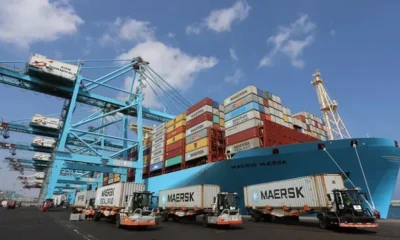

Nigeria gets $600 million investment from Danish firm Moller-Maersk
Nigeria’s presidency said on Sunday that President Bola Tinubu had secured an investment of $600 million from Danish shipping and...
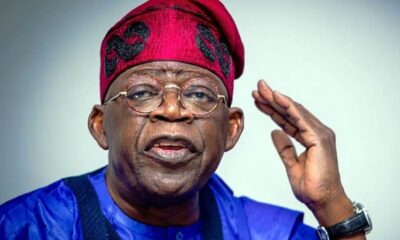

I saved Nigeria from bankruptcy by removing fuel subsidy— Tinubu
Nigerian President, Bola Tinubu, on Sunday, boasted that he saved Nigeria from going bankrupt by removing fuel subsidy on his...


Behind the News: All the backstories to our major news this week
Over the past week, there were lots of important stories from around the African continent, and we served you some...
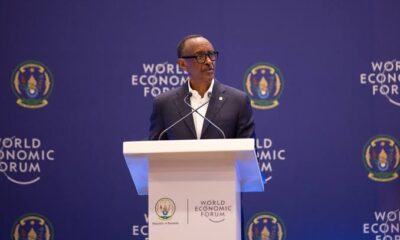

Video: How Rwanda is driving Ai revolution in Africa
In this video, the Managing Director of Rwanda’s Centre for the Fourth Industrial Revolution, Crystal Rugege, speaks on the country’s...


This Sudan war is too senseless; time we ended it, By Tee Ngugi
Why are the Sudanese Armed Forces (SAF) and the paramilitary Rapid Support Forces (RPF) engaged in a vicious struggle? It...
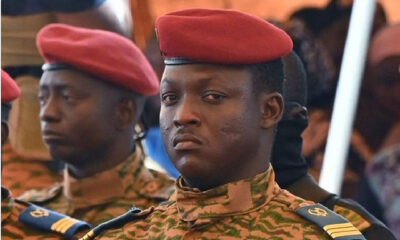

Burkina Faso investigating reports of northern killings
A government spokesman has revealed that Burkina Faso is looking into reports that 223 people were killed by the Burkinabe...
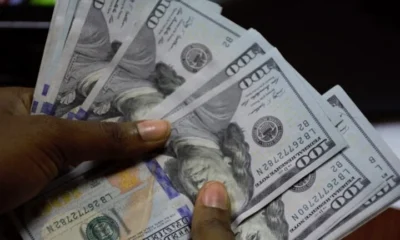

Nigeria: Bureaux De Change operators to harmonise retail FX market
Amidst the volatility around the Nigerian currency and its foreign exchange market, the Association of Bureaux De Change Operators in...


France willing to pay for Morocco’s 3GW power line to Western Sahara
Bruno Le Maire, the French finance minister, said on Friday that France was ready to help pay for a 3...
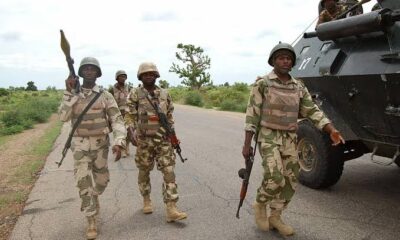

Nigerian troops neutralise 216 terrorists, arrest 332 in one week— Official
The Nigerian Army Defence Headquarters (DHQ) says troops from different operation theaters across the country neutralised 216 terrorists and arrested...
Trending
-

 Tech2 days ago
Tech2 days agoRepAir, Cella partner to launch carbon capture in Kenya
-

 Culture2 days ago
Culture2 days agoCollabo with Burna Boy enabled me buy house for my mum— Mozambican DJ Tarico
-

 Behind the News21 hours ago
Behind the News21 hours agoBehind the News: All the backstories to our major news this week
-

 Sports2 days ago
Sports2 days agoAl Ahly, Esperance to clash in CAF Champions League final


